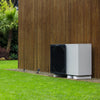
Biomass Boiler vs. Heat Pumps: Which Is Right for Your Off-Grid Home?
, 12 min reading time

, 12 min reading time
Choosing between a biomass boiler and a heat pump for your off-grid UK home can be challenging. This in-depth guide compares both systems across cost, efficiency, maintenance, environmental impact, and suitability for cold climates. Biomass boilers offer consistent heating and are ideal for colder, rural areas with fuel access. Heat pumps shine in efficiency, maintenance ease, and long-term savings—best for well-insulated homes. Find out which system aligns with your lifestyle, budget, and sustainability goals.
When you're living off the gas grid in the UK, choosing the right heating system is a major decision. Two of the most popular renewable heating options are biomass boilers and heat pumps. Both offer environmentally friendly heating, but which one is best for your home?
This guide will break down the key differences, costs, pros and cons, and performance factors to help you decide.
1. What Are Biomass Boilers and Heat Pumps?
Before we compare, let's take a quick look at how each system works.
🔥 Biomass Boilers: Wood-Powered Heating
Biomass boilers burn organic materials (such as wood pellets, logs, or wood chips) to generate heat for radiators, underfloor heating, and hot water. They function much like traditional gas or oil boilers but use renewable fuel instead.
💡 Ideal for: Homes with space for fuel storage and easy access to wood fuel.
❄️ Heat Pumps: Electricity-Powered Efficiency
Heat pumps extract heat from the air, ground, or water and transfer it into your home using electricity. They work like a refrigerator in reverse, using natural heat sources to provide heating and hot water.
💡 Ideal for: Well-insulated homes with low-temperature heating systems (such as underfloor heating).
2. Upfront Costs: Which is More Expensive?
💰 Cost Breakdown
|
Cost Factor |
Biomass Boiler |
Heat Pump |
|
Installation |
£8,000–£20,000 |
£8,000–£20,000 |
|
Fuel Storage Costs |
£2,000–£5,000 (if needed) |
None |
|
Total Cost |
£8,000–£25,000 |
£8,000–£20,000 |
🔥 Biomass boilers are generally cheaper upfront but require fuel storage, which adds extra costs.
❄️ Heat pumps are more expensive but require little extra equipment beyond the heat exchanger.
💡 Government Grants:
3. Running Costs: Which System Is Cheaper Over Time?
🔥 Biomass Boiler Running Costs
❄️ Heat Pump Running Costs
4. Maintenance: Hands-On vs. Low Maintenance
|
Factor |
Biomass Boiler |
Heat Pump |
|
Fuel Deliveries |
Required |
None |
|
Ash Cleaning |
Weekly (unless automated) |
None |
|
Annual Servicing |
Required |
Recommended but minimal |
|
Expected Lifespan |
20+ years |
20+ years |
🔥 Biomass boilers need regular maintenance – fuel deliveries, ash cleaning, and flue inspections.
❄️ Heat pumps are mostly hands-off, requiring only occasional servicing.
💡 Winner: Heat pumps are easier to maintain.
5. Efficiency: Which System Uses Energy Better?
🔥 Biomass Boiler Efficiency
❄️ Heat Pump Efficiency (COP - Coefficient of Performance)
💡 Winner: Heat pumps are significantly more efficient than biomass boilers, reducing running costs.
6. Environmental Impact: Which is Greener?
🔥 Biomass Boiler Carbon Emissions
❄️ Heat Pump Carbon Emissions
💡 Winner: Heat pumps are the greener choice when powered by clean electricity.
7. Space Requirements: Which Takes Up Less Room?
|
Factor |
Biomass Boiler |
Heat Pump |
|
Boiler Size |
Large |
Compact |
|
Fuel Storage |
Needs significant space |
None |
|
Outdoor Unit |
Not needed |
Required for air-source models |
🔥 Biomass boilers require a dedicated space for fuel storage (wood pellets, logs, or chips).
❄️ Heat pumps need an outdoor unit but take up less indoor space.
💡 Winner: Heat pumps require less space.
8. Performance in Cold Weather
🔥 Biomass boilers work in all weather conditions – they provide consistent heat even in extreme cold.
❄️ Heat pumps are less efficient in freezing temperatures – below -5°C, they may need a backup heating source.
💡 Winner: Biomass boilers perform better in very cold climates.
Final Verdict: Which System is Right for You?
|
Factor |
Best Choice |
|
Upfront Cost |
Biomass Boiler |
|
Running Cost |
Heat Pump |
|
Maintenance |
Heat Pump |
|
Efficiency |
Heat Pump |
|
Environmental Impact |
Heat Pump |
|
Space Requirement |
Heat Pump |
|
Cold Weather Performance |
Biomass Boiler |
Choose a Biomass Boiler if:
✔ You have space for fuel storage
✔ You want a consistent heat supply, even in extreme cold
✔ You don’t mind regular maintenance
Choose a Heat Pump if:
✔ You want lower running costs
✔ You prefer a low-maintenance system
✔ Your home is well-insulated
✔ You have access to renewable electricity
Next Steps: Get Expert Advice
Still unsure which system is best for your home? Speak to a professional for a personalised assessment.
Check out these resources for more information:
Share information and details about these products